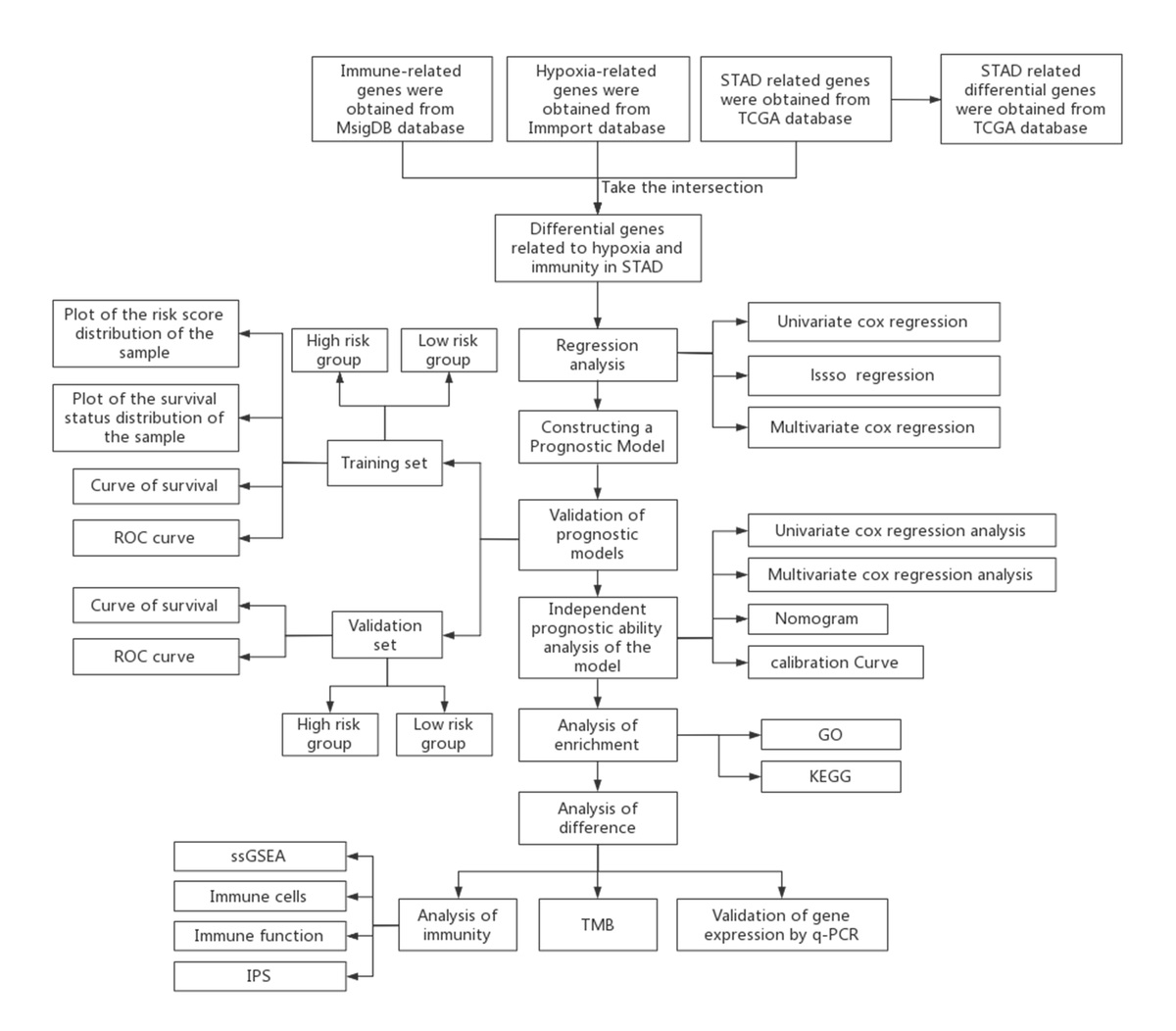Current issue
Archive
Manuscripts accepted
About the Journal
Editorial office
Editorial board
Section Editors
Abstracting and indexing
Subscription
Contact
Ethical standards and procedures
Most read articles
Instructions for authors
Article Processing Charge (APC)
Regulations of paying article processing charge (APC)
GASTROENTEROLOGY / RESEARCH PAPER
A prognostic model for STAD based on hypoxia- and immune-related genes
1
Center of Gastrointestinal and Minimally Invasive Surgery, Department of General Surgery, The Third People’s Hospital of Chengdu, Affiliated Hospital of Southwest Jiaotong University & The Second Affiliated Hospital of Chengdu, Chongqing Medical University, Chengdu 610031, China., China
Submission date: 2023-01-13
Final revision date: 2023-06-06
Acceptance date: 2023-06-06
Online publication date: 2023-06-17
Corresponding author
Xing Wen
Center of Gastrointestinal and Minimally Invasive Surgery, Department of General Surgery, The Third People’s Hospital of Chengdu, Affiliated Hospital of Southwest Jiaotong University & The Second Affiliated Hospital of Chengdu, Chongqing Medical University, Chengdu 610031, China., China
Center of Gastrointestinal and Minimally Invasive Surgery, Department of General Surgery, The Third People’s Hospital of Chengdu, Affiliated Hospital of Southwest Jiaotong University & The Second Affiliated Hospital of Chengdu, Chongqing Medical University, Chengdu 610031, China., China
KEYWORDS
TOPICS
ABSTRACT
Introduction:
Featured with vast heterogeneity, gastric cancer (GC) is one of the leading causes of cancer-related deaths. A specific prognostic model is necessary for the improvement of clinical treatment strategies. Hypoxia is a common feature in the tumor microenvironment that promotes tumor progression. However, the current evaluation of hypoxic tumor immune microenvironment in GC is still inadequate.
Material and methods:
With sequence data and single nucleotide variants data obtained from The Cancer Genome Atlas-STAD dataset as well as hypoxia- and immune-related genes acquired from MsigDB and ImmPort, a hypoxia-immune-based gene signature of gastric adenocarcinoma (STAD) was built by Cox regression analysis. Riskscore could be used as an independent prognostic factor.
Results:
Receiver operating characteristic curve and survival curve showed the accuracy of the model. Pearson correlation analysis showed that DUSP1, one of the hypoxia- and immune-related feature genes, was positively correlated with immune cell scores and immune-related function scores. In addition, low-risk group peers were found to be in higher immune infiltration status and had higher immunophenoscore as demonstrated by single-sample GSEA, indicating better response to immune checkpoint inhibitors (ICI) treatment among the low-risk group. q-PCR results showed that DUSP1, IGFBP1, CGB5, GPC3 and EGF were significantly highly expressed in STAD cells, while FAM3D and FGF8 were significantly down-regulated.
Conclusions:
Overall, our study not only paves the way for future studies focusing on hypoxia and immune microenvironment but also improves STAD patient’s prognosis and their response to immunotherapy.
Featured with vast heterogeneity, gastric cancer (GC) is one of the leading causes of cancer-related deaths. A specific prognostic model is necessary for the improvement of clinical treatment strategies. Hypoxia is a common feature in the tumor microenvironment that promotes tumor progression. However, the current evaluation of hypoxic tumor immune microenvironment in GC is still inadequate.
Material and methods:
With sequence data and single nucleotide variants data obtained from The Cancer Genome Atlas-STAD dataset as well as hypoxia- and immune-related genes acquired from MsigDB and ImmPort, a hypoxia-immune-based gene signature of gastric adenocarcinoma (STAD) was built by Cox regression analysis. Riskscore could be used as an independent prognostic factor.
Results:
Receiver operating characteristic curve and survival curve showed the accuracy of the model. Pearson correlation analysis showed that DUSP1, one of the hypoxia- and immune-related feature genes, was positively correlated with immune cell scores and immune-related function scores. In addition, low-risk group peers were found to be in higher immune infiltration status and had higher immunophenoscore as demonstrated by single-sample GSEA, indicating better response to immune checkpoint inhibitors (ICI) treatment among the low-risk group. q-PCR results showed that DUSP1, IGFBP1, CGB5, GPC3 and EGF were significantly highly expressed in STAD cells, while FAM3D and FGF8 were significantly down-regulated.
Conclusions:
Overall, our study not only paves the way for future studies focusing on hypoxia and immune microenvironment but also improves STAD patient’s prognosis and their response to immunotherapy.
Share
RELATED ARTICLE
We process personal data collected when visiting the website. The function of obtaining information about users and their behavior is carried out by voluntarily entered information in forms and saving cookies in end devices. Data, including cookies, are used to provide services, improve the user experience and to analyze the traffic in accordance with the Privacy policy. Data are also collected and processed by Google Analytics tool (more).
You can change cookies settings in your browser. Restricted use of cookies in the browser configuration may affect some functionalities of the website.
You can change cookies settings in your browser. Restricted use of cookies in the browser configuration may affect some functionalities of the website.



